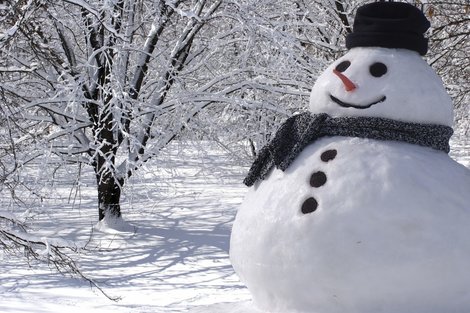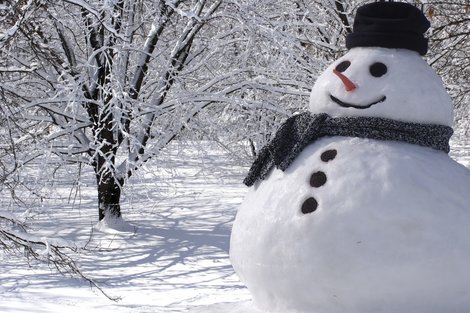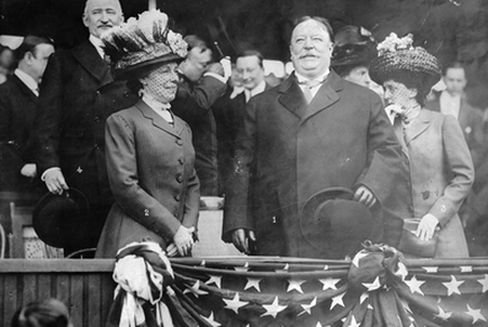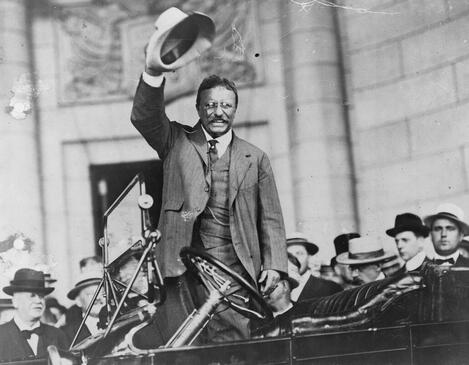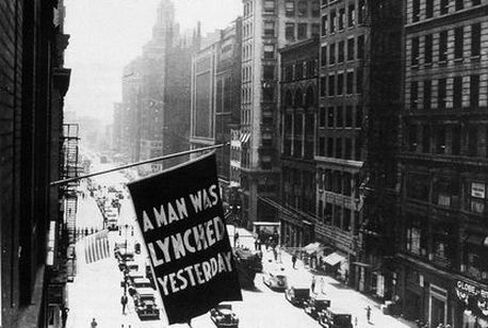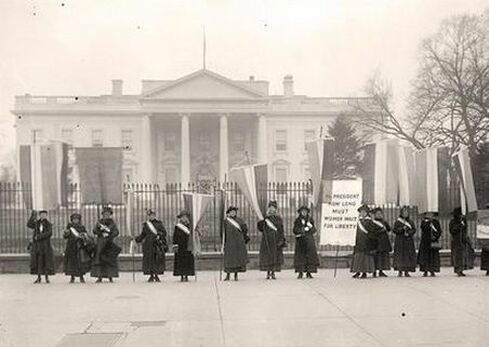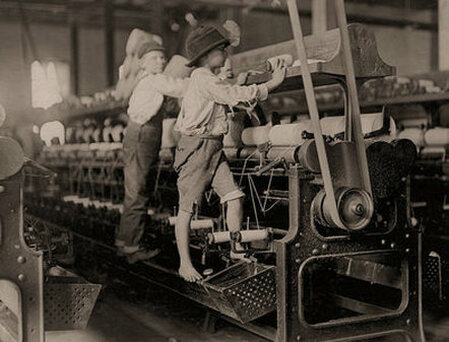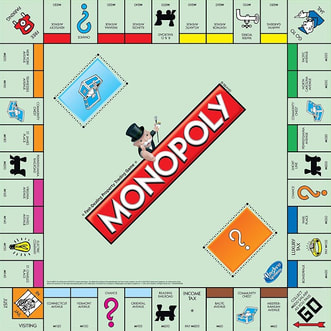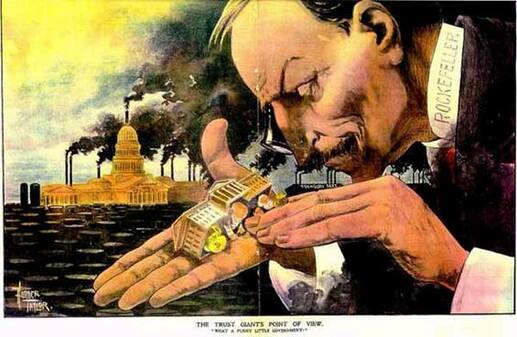|
Learning Target:
I can analyze the effectiveness of Progressive Era political reforms in addressing the problems of the late 19th and early 20th centuries. Critical Vocabulary: “Square Deal,” Anthracite Coal Strike, Northern Securities Company, “Trust-Buster,” Department of Commerce and Labor, Elkins Act, Hepburn Act, Upton Sinclair, The Jungle, Meat Inspection Act, Pure Food and Drug Act, Newlands Act of 1902, John Muir, Sierra Club, Payne-Aldrich Tariff, Ballinger-Pinchot Dispute, “Old Guard” Republicans, “New Nationalism,” “Bull Moose” Party, “New Freedom,” “Triple Wall of Privilege,” Underwood Tariff Bill, Sixteenth Amendment, Federal Reserve Act, Federal Reserve Board, Federal Trade Commission Act, Clayton Anti-Trust Act Today's Agenda:
Homework: Progressive Politics Reading Learning Target:
I can analyze the effectiveness of Progressive Era political reforms in addressing the problems of the late 19th and early 20th centuries. Critical Vocabulary: “Square Deal,” Anthracite Coal Strike, Northern Securities Company, “Trust-Buster,” Department of Commerce and Labor, Elkins Act, Hepburn Act, Upton Sinclair, The Jungle, Meat Inspection Act, Pure Food and Drug Act, Newlands Act of 1902, John Muir, Sierra Club, Payne-Aldrich Tariff, Ballinger-Pinchot Dispute, “Old Guard” Republicans, “New Nationalism,” “Bull Moose” Party, “New Freedom,” “Triple Wall of Privilege,” Underwood Tariff Bill, Sixteenth Amendment, Federal Reserve Act, Federal Reserve Board, Federal Trade Commission Act, Clayton Anti-Trust Act Today's Agenda:
Homework: The Progressive Era Reading Learning Target:
I can summarize the changes that took place in American cities from 1860-1915, & I can predict the problems that will arise as a result. Critical Vocabulary: Jacob A. Riis, How the Other Half Lives, “Muckrakers,” Lincoln Steffens , Ida Tarbell, Eugene V. Debs, William “Big Bill” Haywood, Mary Harris “Mother” Jones, Industrial Workers of the World, Social Gospel Movement, Robert La Follette, Wisconsin Idea, National Child Labor Committee, Triangle Shirtwaist Fire, Florence Kelley, National Consumers League, Muller v. Oregon, National American Woman’s Suffrage Association, Nineteenth Amendment, Plessy v. Ferguson, Booker T. Washington, Tuskegee Institute, “Atlanta Compromise,” W.E.B. Du Bois, Niagara Movement Today's Agenda:
Learning Target:
I can summarize the changes that took place in American cities from 1860-1915, & I can predict the problems that will arise as a result. Critical Vocabulary: Jacob A. Riis, How the Other Half Lives, “Muckrakers,” Lincoln Steffens , Ida Tarbell, Eugene V. Debs, William “Big Bill” Haywood, Mary Harris “Mother” Jones, Industrial Workers of the World, Social Gospel Movement, Robert La Follette, Wisconsin Idea, National Child Labor Committee, Triangle Shirtwaist Fire, Florence Kelley, National Consumers League, Muller v. Oregon, National American Woman’s Suffrage Association, Nineteenth Amendment, Plessy v. Ferguson, Booker T. Washington, Tuskegee Institute, “Atlanta Compromise,” W.E.B. Du Bois, Niagara Movement Today's Agenda:
Homework: America Moves to the City Reading Learning Target:
I can summarize the changes that took place in American cities from 1860-1915, & I can predict the problems that will arise as a result. Critical Vocabulary: Jacob A. Riis, How the Other Half Lives, “Muckrakers,” Lincoln Steffens , Ida Tarbell, Eugene V. Debs, William “Big Bill” Haywood, Mary Harris “Mother” Jones, Industrial Workers of the World, Social Gospel Movement, Robert La Follette, Wisconsin Idea, National Child Labor Committee, Triangle Shirtwaist Fire, Florence Kelley, National Consumers League, Muller v. Oregon, National American Woman’s Suffrage Association, Nineteenth Amendment, Plessy v. Ferguson, Booker T. Washington, Tuskegee Institute, “Atlanta Compromise,” W.E.B. Du Bois, Niagara Movement Today's Agenda:
Homework: America Moves to the City Reading
Learning Target:
I can summarize the changes that took place in American cities from 1860-1915, & I can predict the problems that will arise as a result. Critical Vocabulary: Jacob A. Riis, How the Other Half Lives, “Muckrakers,” Lincoln Steffens , Ida Tarbell, Eugene V. Debs, William “Big Bill” Haywood, Mary Harris “Mother” Jones, Industrial Workers of the World, Social Gospel Movement, Robert La Follette, Wisconsin Idea, National Child Labor Committee, Triangle Shirtwaist Fire, Florence Kelley, National Consumers League, Muller v. Oregon, National American Woman’s Suffrage Association, Nineteenth Amendment, Plessy v. Ferguson, Booker T. Washington, Tuskegee Institute, “Atlanta Compromise,” W.E.B. Du Bois, Niagara Movement Today's Agenda:
Homework: America Moves to the City Reading Learning Target:
I can describe the growth of industry in the United States, & I can assess its impact on American society. Critical Vocabulary: Andrew Carnegie, Bessemer Process, Vertical Integration, J.P. Morgan, United States Steel Corporation, John D. Rockefeller, Standard Oil Company, Trust, Cornelius Vanderbilt, Herbert Spencer,Social Darwinism, Interstate Commerce Act, Interstate Commerce Commission, Sherman Anti-Trust Act, Wage Slaves, Commonwealth v. Hunt, National Labor Union, Contract Labor Law, Knights of Labor, Terence V. Powderly, Haymarket Square Riot, American Federation of Labor, Samuel Gompers, Strike Fund, Molly Maguires, Pinkerton Detective Agency, Great Railroad Strike of 1877, Homestead Strike, Henry C. Frick, Pullman Strike, Eugene V. Debs Today's Agenda:
Homework: The Age of Industry Reading Learning Target:
I can describe the growth of industry in the United States, & I can assess its impact on American society. Critical Vocabulary: Andrew Carnegie, Bessemer Process, Vertical Integration, J.P. Morgan, United States Steel Corporation, John D. Rockefeller, Standard Oil Company, trust, Cornelius Vanderbilt, Herbert Spencer,Social Darwinism, Interstate Commerce Act, Interstate Commerce Commission, Sherman Anti-Trust Act, Wage Slaves, Commonwealth v. Hunt, National Labor Union, Contract Labor Law, Knights of Labor, Terence V. Powderly, Haymarket Square Riot, American Federation of Labor, Samuel Gompers, strike fund, Molly Maguires, Pinkerton Detective Agency, Great Railroad Strike of 1877, Homestead Strike, Henry C. Frick, Pullman Strike, Eugene V. Debs Today's Agenda:
Homework: The Age of Industry Reading |
A life is not important except in the impact it has on other lives.
-Jackie Robinson AnnouncementsMay 21: No School
May 27: No School May 30: Last Day ResourcesArchives
May 2019
Visitors |
